Classics of the genre: ombre, shatush, balajazh and others
Plunging into the world of coloring, let’s start with the basics, which have been popular for at least several years.
Ombre
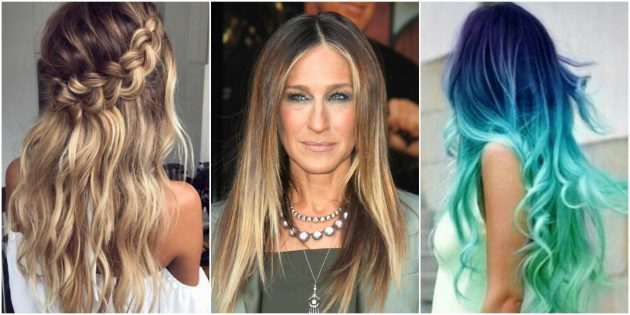
The name of this technique of coloring is French roots, which go back to the word “shadow”. This is traditionally called the creation of a smooth gradient (gradual) transition from darkened roots to lighter tips. “Rooted roots” – it’s about it, ombre, in its most budgetary performance.
It is believed that one of the first celebrities who popularized this technique was the star of “Sex in the Big City” Sarah Jessica Parker, flashing “rooted roots” (naturally painted in a trendy salon) in 2010.
But rather quickly the ombre has outgrown the stage of naturalness and has acquired color variations when the ends of the hair are no longer lightened, and sometimes painted in fairly bright colors. By the way, an interesting option for the brave.
Yes, if in the hairdresser you are offered to make a gradient or degradation, you know: it’s all the same ombre, just under a different name.
Sombre
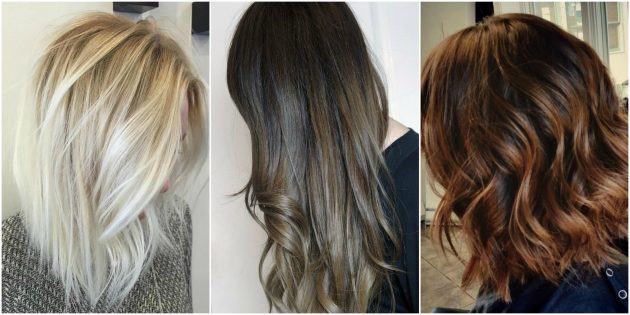
Sombra will be obtained if the traditional ombre provide the prefix c- – soft, soft. The transition of colors here is softened as much as possible, almost unnoticeable. Most often, the somre is done as follows: leave the bulk of the hair untouched, only lightly, literally at 0.5-1 tone, highlighting individual, rather wide strands. As a result, the effect of a slightly burnt out sun, absolutely natural hair, is created.
Balaj
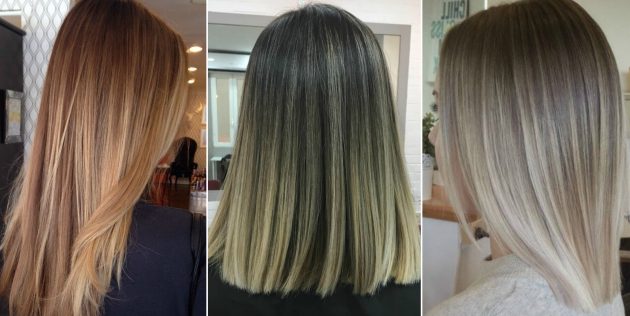
One of the most sparing staining techniques. Balayage is, as a matter of fact, melioration of thin locks of hair, and not on all length, and only tips – a maximum of ⅔ from the total length.
Bronzing
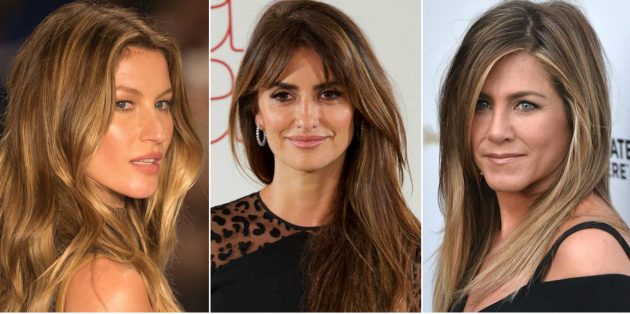
To understand what this staining technique looks like, just remember Jennifer Aniston – a Hollywood star wears a bronze, almost without removing, for many years.
Brond – the same melirovanie (clarification of clear thin strands of hair), but not in one lighter tone, but in different, to create the effect of a natural play of light. There is a strict restriction: bright colors are not allowed, only blond and brown tones are acceptable. Actually, the very name of the technique – bronde – is a mixture of English words blond and brown.
Chatou
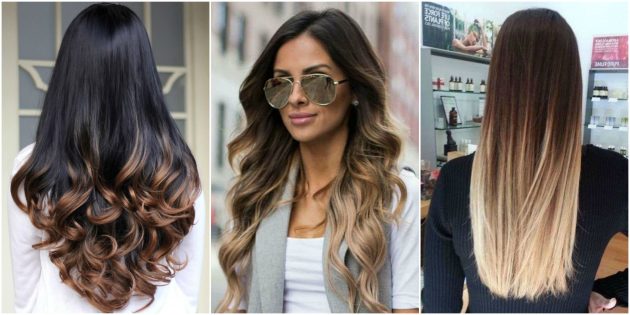
Another variation of lightening individual strands in one or more shades, but with a key nuance: the transition of colors occurs horizontally. Traditional for ombre or a bronze situation, when a part of the hair is lightened only at the tips, and some lighter strands can begin almost from the roots, it is inadmissible here. The transition of colors in this case has, though somewhat blurred, but still quite a distinct horizontal boundary.
What’s new: nude, loud, flamboyant and others
The old good is good, but I always want something new. Here are some more techniques that broke into the world of coloring more recently, literally a year or two ago.
Grombre
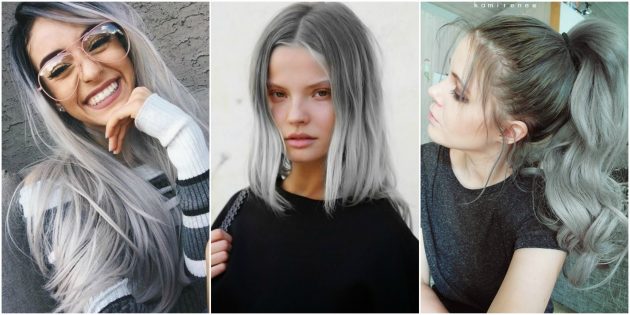
Stylists like to create new concepts by combining old names, and this is the same case: the word “loud” came from the fusion of gray and ombre. You probably already guessed: it’s still the same ombre, but with an emphasis on gray – ashy, steel, gray – hair. Ideal for those who found their first gray hair and now decided to “grow old beautifully,” but among very young girls this provocative staining is also popular.
Nyud
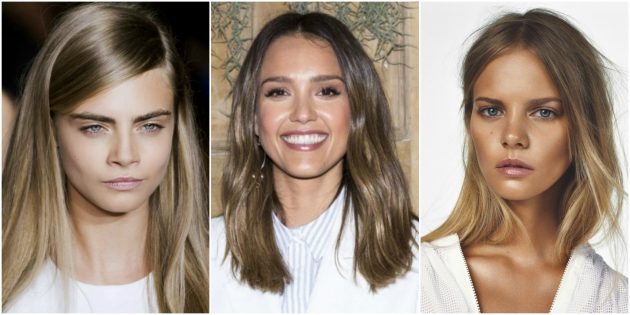
Nyud – this is when the hair, healthy, beautiful, well-groomed, is, but they do not seem to be. They do not attract attention to themselves, allowing to focus on the other: a look, a transparent skin, other characteristics of the image. Staining is performed as naturally as possible, exclusively in restrained, neutral, natural tones, falling into color, eye and skin color.
Flamboyant
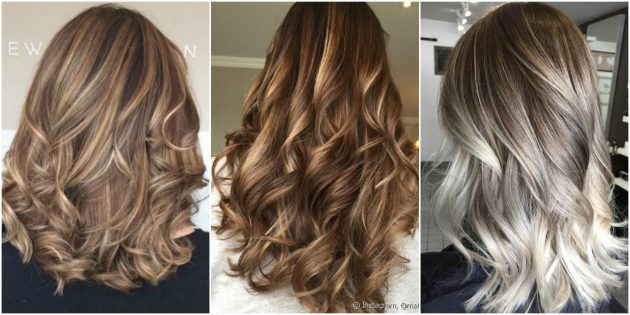
Another fruit of hairdressing incest: comes from the symbiosis of the words “balayage”, “ombre” and adjective flamboyant (catchy). The creator of the Flamboyage, Italian stylist Angelo Seminara (Angelo Seminara) says that with the help of this mix technique he tried to create the most bright, iridescent, lively color of hair. How much he did it, judge for yourself.
Strobing

This technique involves painting in such a way that the effect of light reflection on the hair is created. Strobing is rather complicated in execution: for highlighting strands, there is no single algorithm, the master chooses tones and position himself, focusing on hair features, skin color and other factors.
Succulent
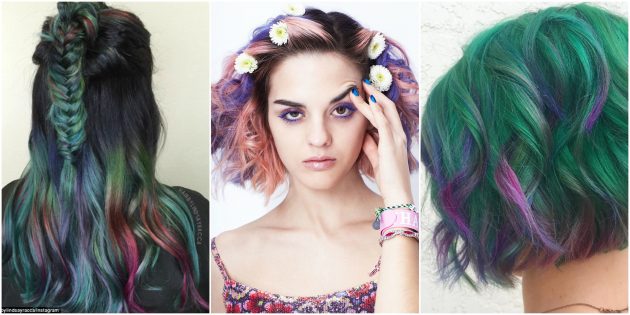
Extraordinary and in many ways ruthless to hair coloring option. The name comes from the Latin word “juicy”, and the mix of colors in which the hair is dyed, is intended to remind you of nature: green herbs, flowering meadows, mysterious, overgrown with a variety of greenery lakes.
This type of staining is chosen mostly by girls of creative professions. In an office with a succulent, of course, do not like. Although…
